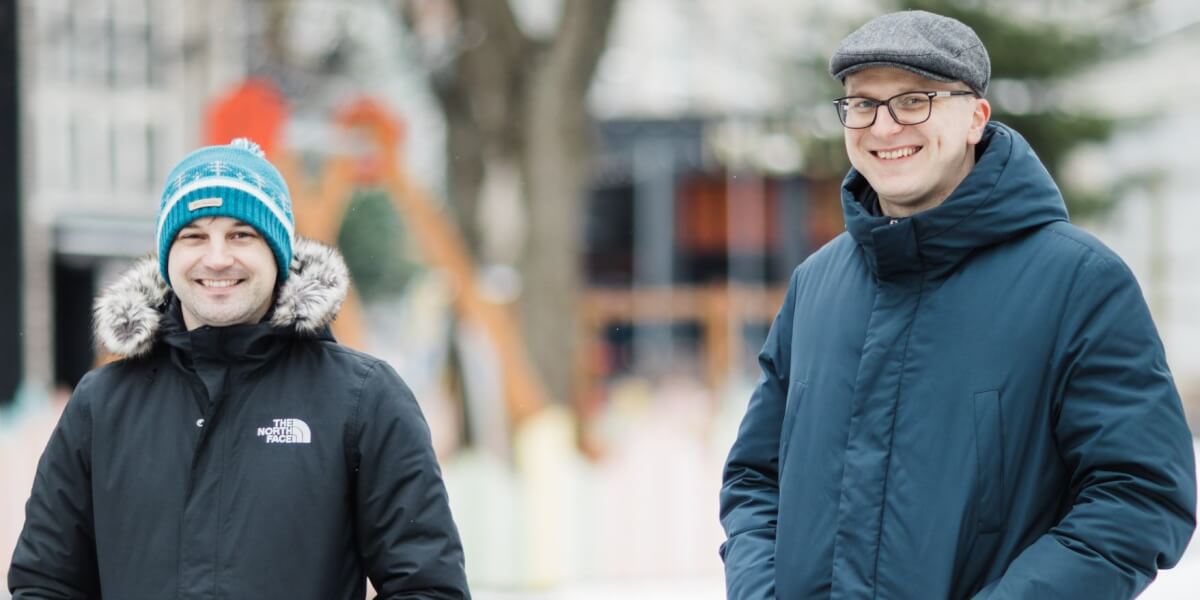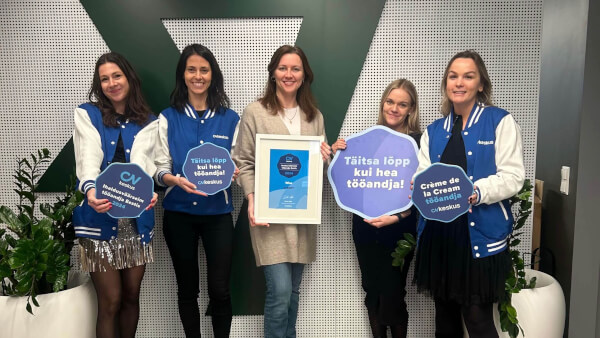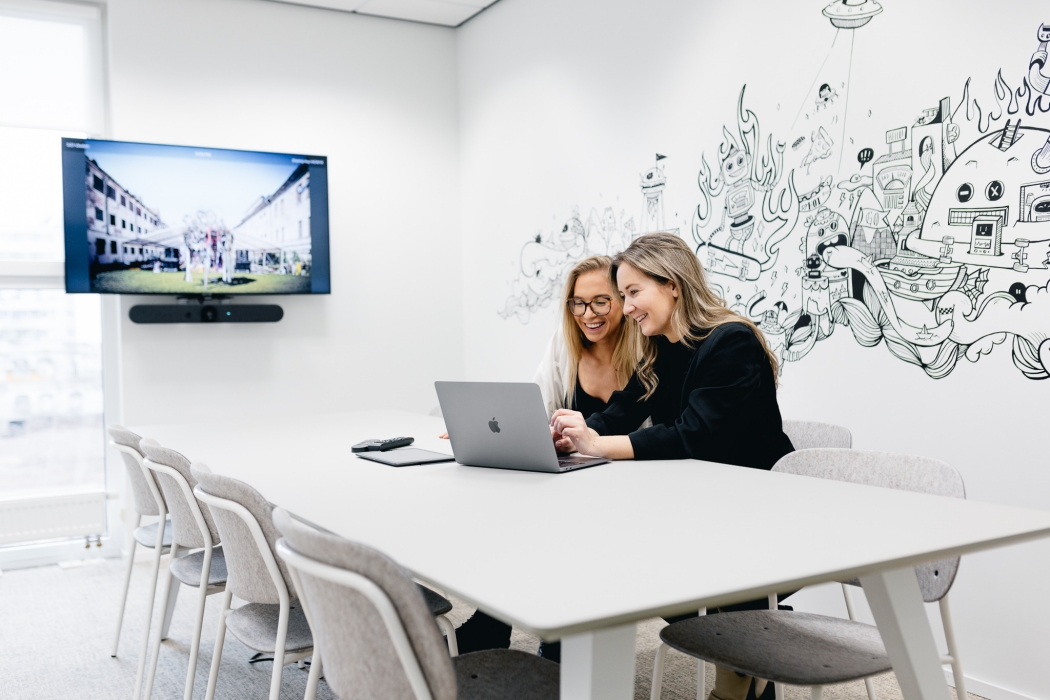Üleskutse kunstitudengitele: aita disainida Wise’i uusi koosolekuruume
Juba 2025. aasta märtsis kolib Wise’i Tallinna tiim uude kontorisse Krulli kvartalis: soovime luua inspireeriva ja tulevikku vaatava töökeskkonna, mis seab...

In 2020, the Good Deed Education Fund and Tallinn Education Board in cooperation with Fontes launched the Internship Programme for Educational Leaders. It is a unique development programme where school headmasters join companies with recognised management culture for short-term internships. In 2021, Wise participated for the second year in a row, welcoming Kaarel Rundu, Headmaster of Tallinn German Gymnasium as an intern. He was mentored by Lars Trunin, Head of UK Product.
Kaarel Rundu is a graduate of the same school he runs today. He started his career at Tallinn German Gymnasium as a psychology intern 14 years ago, which grew into the position of a school psychologist for the next 7 years. Then, supported by a master's degree in School Management he continued his career as Head of Study and after that as Headmaster.
Lars Trunin's first venture was a student company that published, or more precisely, still publishes, study materials. He has been working at Wise for the past 6 years - which in startup terms means he can consider himself a dinosaur. He finds motivation from his team - talented people with let's get it done mentality - and Wise’s autonomous working style.
The conversation with Kaarel and Lars took place in late March when the internship period at Wise was steering towards its end. The original blog post was published in Estonian on the Good Deed Foundation's website.
Did you set yourself any expectations when you started the Internship Programme for Educational Leaders?
Kaarel: Yes and no. I had specific areas of interest, such as (internal) communication and employer branding, the principles of delegation, and data-driven management. On the other hand, I entered the programme with an open mind. I knew I wanted to take the most out of everything that I was offered. I made an agreement with myself to that end. Thanks to this, I was able to explore a number of other exciting topics, like automation. It helped me to develop a cohesive view of the company, including philosophical discussions, reflections on employee empowerment, and acquiring new practical tools and techniques.
Lars: I had a pretty good idea of what the programme was going to be like from last year when Alvar (Lumberg, former Engineering Lead at Wise) mentored Mari-Liis (Sults, Headmaster of Tallinn Art Gymnasium). I worked with Mari-Liis on some projects, so I expected it to be something similar.
I love to work with people who are passionate about what they do, curious about their surroundings and don’t take everything for granted. It gives me the opportunity to reflect back on the world: where and why am I, what do I value, what are the most important aspects in a given situation. The programme gave me a chance to look at the big picture and then gradually delve into deeper layers. Reflection helps to keep a clear focus in decision-making both in your own everyday activities and when you are supporting others.
It looks like you two developed a great connection that doesn't always happen overnight. Was it an immediate click or a longer process for you?
Kaarel: Before the official start of the internship, we had a Zoom meeting at the end of which I realised that I was in good hands. I immediately sensed we were going to have an open and direct communication with Lars and he immediately connected with my questions. I felt that he sincerely wanted to dive into the issues I raised.
In reality, it became a project of growth and development where we had regular check-ins about how we felt the project was going. Our discussions were always encouraging, which gave me a lot of strength and motivated me to push myself even further. I'd describe this period of the programme as climbing, where you are moving higher and higher, with the process itself being very enjoyable. This actually sums up Wise for me nicely: I like their openness and transparency. I can see it both in their communication and in their inner nature, which are essential for a solid company culture.
Lars: We didn't have one asking a question and the other giving the correct answer. Instead, we were equals who looked into a subject and began to explore scenarios and solutions together. We came from entirely different worlds. When he entered the world of Wise to understand how it works, I had to understand how the Wise world would work for him. An open mind was the driving force that helped us along the way.
Kaarel: I would add to what Lars already said that I liked that he had the opportunity to visit my school as well. This gave me a chance to show him my world.
Lars: The school I once studied at and the school I saw now – they're truly day and night! Kaarel’s school environment is designed to meet the needs of the audience, i.e. students, and they have created an excellent learning environment. All activities and hobbies are covered. It was a true wow moment!
Leadership in a school and leadership in a (tech) company, how different are they?
Kaarel: For each organisation, leadership and the role of the leader depend on the culture. I saw a strong and developed culture at Wise with explicit values and mission. Their definition is that Wise is an organisation where everyone does what they feel that needs to be done. The core principles are the same for everyone, but employees can empower themselves through these pillars individually.
If people believe in the company mission, the leadership can be more transparent and the margin of error is relatively small. When people are focused and empowered, the company can move towards its purpose faster.
When I think about schools and the Estonian education system more broadly, they're structured in a rather person-centric way. At Wise, on the other hand, the company culture persists even when people come and go. In some cases, this works well for schools, but on the other hand, it's harder to sustain the culture and the leader's departure might have a painful effect on the whole school. However, I'm thrilled for my school: they did so well while I was away! Running the school doesn't come down to just me. We have cooperation; in the absence of some members, the whole team doesn't collapse.
The more the leadership culture is developed in the education system, and the more the private and public sectors work together to educate young people, the greater the win for us all. This is the main reason why I recommend everyone to participate in the Internship Programme. Not only school heads but also top education leaders.
Lars, what did you learn from Kaarel as a leader and a person?
I've been in this startup bubble for quite some time. There is a feeling and an understanding that the world can only be changed with startups. Kaarel brought me back on the ground. This is not the only way; there are more areas and opportunities. I also realised that the principles of how we operate and approach problem-solving are standard and applicable elsewhere.
Thanks to Kaarel, I saw how open the world of education is. Looking from a distance it might seem much more closed. It has been truly inspirational experience and gave me great faith in education and school development. Especially with leaders like Kaarel.
Kaarel, what was your most significant Eureka moment?
Lars once told me that he finds motivation from creating an impact. This thought never left me. It made me realise that the right path for me was to go back to my school. What he said describes well how I feel: I wish to create a school I myself would have wanted to attend.
At Wise, I asked people what we should teach youngsters in schools. A few main things emerged: the ability to learn, the ability to retrain and adapt to new circumstances, and social skills such as empathy and communication. This input came from people in financial technology, which drives home the point that it’s not just specific knowledge or experience that matters. Attitude matters. If a person is awesome by nature, then everything else can be acquired.
In addition, engagement and bottom-up management are both extremely important. Involving people in decision-making process and giving them the opportunity to express their opinion. Wise asks its teams constant feedback to understand what people think. I’d like to implement a similar approach in schools. To have students involved in designing the curriculum and in the decision-making of elective courses. We already implemented a similar feedback loop for the school’s renovation process.
Any final thoughts?
Kaarel: The Internship Programme of the Good Deed Education Fund is an excellent initiative, like a startup on its own. It shows that the field of education is valued. The education system is wide open to people from the private sector coming to run schools. We're not only short of teachers, there's also a lack of new school leaders. The symbiosis and cooperation between the private and the public sector can create exciting new opportunities to tackle this.
Lars: In fact, some people have moved from startups to become education leaders. One good example is the two young women running the Jõhvi Coding School in tandem. Some Wisers have moved back to education with the Back to School (Tagasi Kooli). This is happening more and more.
Learn more about Wise's education related initiatives from the Next Generation page.
*Palun vaadake kasutustingimusi ja teie piirkonna toote kättesaadavuse teavet või külastage lehte Wise’i tasud ja hinnad, et saada värskeimat teavet hindade ja tasude kohta.
See info on esitatud üldise teavitamise eesmärgil ning see ei kujuta endast Wise Payments Limitedi ega tema tütarettevõtete või sidusettevõtete juriidilist, maksualast ega muud laadi professionaalset nõuannet ning see pole mõeldud finantsnõustajalt või üheltki teiselt spetsialistilt nõu saamise asendamiseks.
Me ei esita mingeid otseseid ega kaudseid kinnitusi, garantiisid ega tagatisi selle teabe täpsuse, täielikkuse ega ajakohasuse kohta.

Juba 2025. aasta märtsis kolib Wise’i Tallinna tiim uude kontorisse Krulli kvartalis: soovime luua inspireeriva ja tulevikku vaatava töökeskkonna, mis seab...

Tööportaal CVKeskus viis läbi inimeste tööootuste ja tööandja maine uuringu, mille tulemusel selgus rõõmustav uudis – Wise on kolme ettevõtte hulgas, kelle...

Wise’i tellitud Norstati värske uuring näitab, et kuigi huvi IT-d õppida püsib 16-19aastaste noorte seas võrreldes eelmise aastaga samal tasemel, siis soov...

Wise’i tellitud Norstati värske uuring näitab, et 16-19aastaste noorte huvi ettevõtluse vastu on võrreldes eelmiste aastatega hüppeliselt kasvanud. Kui...

Wise'i uuring: Mis motiveerib noori töökoha valikul?

Wise’i tellimusel uuris Kantar Emor kolmandat korda 16-19aastaste noorte eelistusi tulevase eriala valikul. Selgus, et kuigi eelmisel aastal huvi...